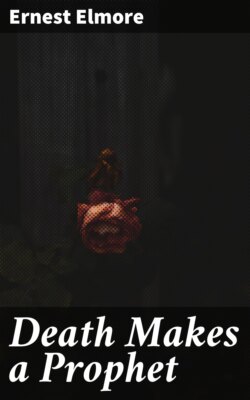Читать книгу Death Makes a Prophet - Ernest Elmore - Страница 14
На сайте Литреса книга снята с продажи.
I
ОглавлениеTable of Contents
It would be impossible to describe the various forms of ritual practised by the Children of Osiris without writing an exhaustive treatise on Cooism. There is such a book available to the general public—The Development, Practice, and General Principles of the Cult of Coo by Eustace K. Mildmann—Utopia Press—21/-. The work is in two volumes. The reading is not, alas, very much snappier than the title. But a word about the constitutional side of Cooism is, perhaps, essential.
Apart from the High Prophet and the Prophet-in-Waiting, the fortunes of the Movement were presided over by the members of the Inmost Temple. These numbered six—three High Priests and three High Priestesses. Among the latter, of course, was Mrs. Hagge-Smith. For all her airy assumption that she had this governing body in her pocket, Mrs. Hagge-Smith was more optimistic than accurate. There were at least two other members of the Inmost Temple who carried nearly as much weight in the order as she did—Penelope Parker and Hansford Boot. Both had money, which made them quite independent of Mrs. Hagge-Smith’s whims and prejudices. And both had brains which in Mrs. Hagge-Smith’s case were at a premium. Alicia admittedly had energy and enthusiasm but when it came to academic matters she was a broken reed. Hansford was Eustace Mildmann’s stoutest champion. Penelope backed Penpeti. The other three members of the Inmost Temple, although less influential, had, despite Alicia’s insidious propaganda remained loyal to the founder of the Movement. But the rift dividing these two factions had been steadily widening and at the meeting convened to discuss the idea of a Summer Convention matters reached a new high level of tension.
“Wrong approach. Stupid!” exclaimed Hansford Boot, who spoke a kind of shorthand English peculiarly his own. “Tents. Trees. Arcadian idyll angle. Ridiculous. Laughable. Too frivolous. Don’t like it.”
“I must say...” began Eustace with a nod of approval, “that as the founder of the order I—”
“Balderdash!” shot out Mrs. Hagge-Smith. “We must carry Cooism out into the world. This parochial attitude shows a deplorable lack of spirit. We must grow and grow and grow!” She made a gesture of expansion which caused the committee-men on either side of her to lean back quickly in their chairs. “We must no longer hide our light under a bushel. We want to gather more and more children to our bosom.” She made a gesture of gathering children to her bosom, which enabled the committee-men to tilt forward again, though they kept a wary eye open for any further hint of expansion. “I know that I have the full support of our splendid Prophet-in-Waiting and I suggest we call upon dear Mr. Penpeti to express his views.”
Penpeti did so with voluble charm, his rich voice resounding under the tin-roof of the temple and causing a frisson of voluptuous pleasure to course down Penelope’s spine. The weaker section of the opposition began to waver. Hansford came back with a further series of staccato objections. Eustace again attempted to back him up, only to be interrupted a second time by his redoubtable patron. Penelope said nothing. Penpeti painted a noble and imaginative picture of thousands of sunburned, smiling devotees in rational clothing, strolling happily under the immemorial elms of Old Cowdene Park. Hansford sketched in an impressionistic picture of those same thousands clad in mackintoshes and goloshes squelching about in the mud beneath immemorial elms that dripped and whipped in a cold June wind. Mrs. Hagge-Smith said: “Balderdash!” Eustace put in timidly: “As High Prophet I do beg of you to allow me—” But this time it was Penelope, speaking for the first time, who interrupted him.
She spoke languidly, mystically, in her soft attractive drawl for ten minutes without a break. Her slender hands wove esoteric patterns on the air. The gauzy veil over her corn-coloured hair was like an aura about her and the pale oval of her face was lit with the beauty of pure devotion. The male section of the committee, with the exception of Penpeti was held spellbound. Yes—even Eustace’s weak eyes were expressive of tenderness and admiration. He gazed at Penelope as if she were the reincarnation of some ancient goddess, of Isis herself, perhaps, the hallowed wife of Osiris. In fact he had always believed that she was Isis reborn. In the same way, with the most abject humility of course, he wondered if he might not be a resurrected Osiris. Beyond that he dare not think without exercising the more profane side of his imagination. He only knew that Penelope’s presence was a kind of sweet torment, a perilous distraction. Unfortunately Eustace was one of those prize idiots who fondle the belief that no man over fifty can fall in love. He was unable therefore to diagnose his state-of-mind with any accuracy. Actually Eustace was climbing the first rungs of a ladder that was to lead him to dizzy heights of foolishness and mental anguish. Fate, in short, had earmarked Penelope as his Achilles heel.
When, therefore, Penelope declared herself in favour of Mrs. Hagge-Smith’s idea, Eustace’s opposition collapsed. The matter was put to the vote, and the motion, with the single exception of Hansford Boot, received the full support of the committee. Mrs. Hagge-Smith’s vision was already well on the way to becoming a reality.
